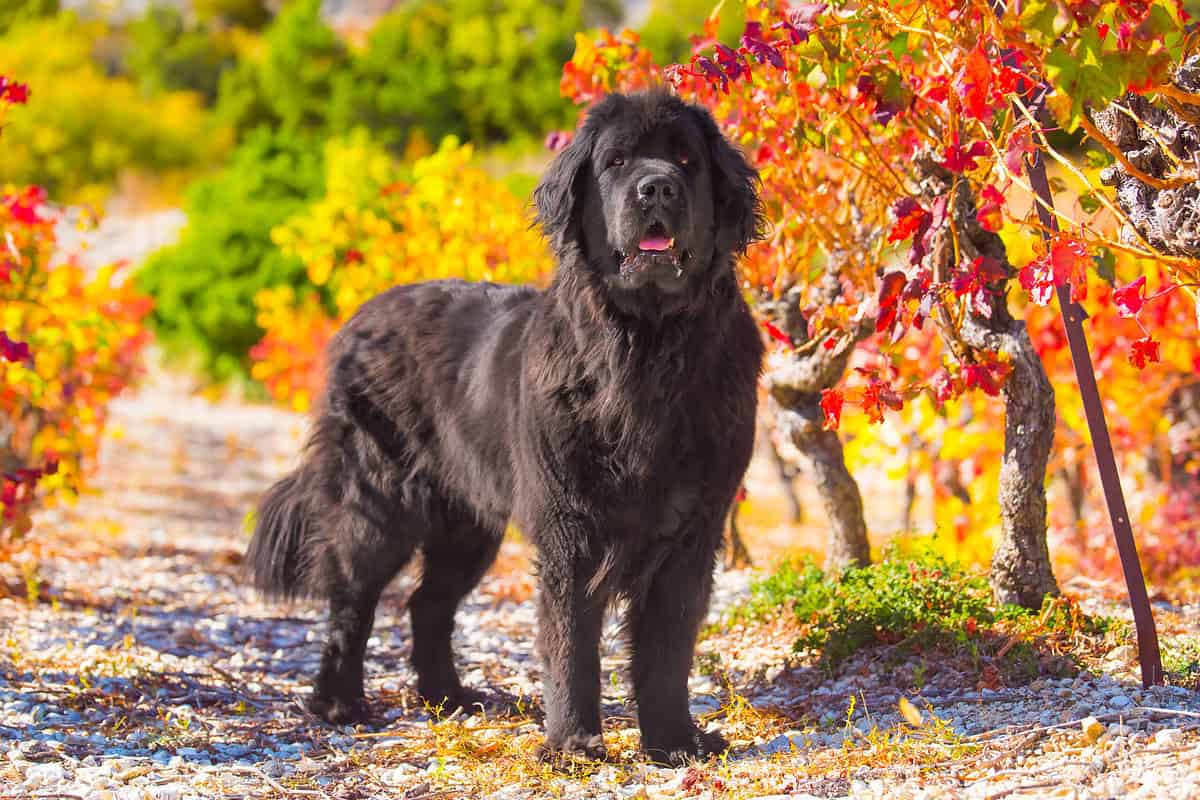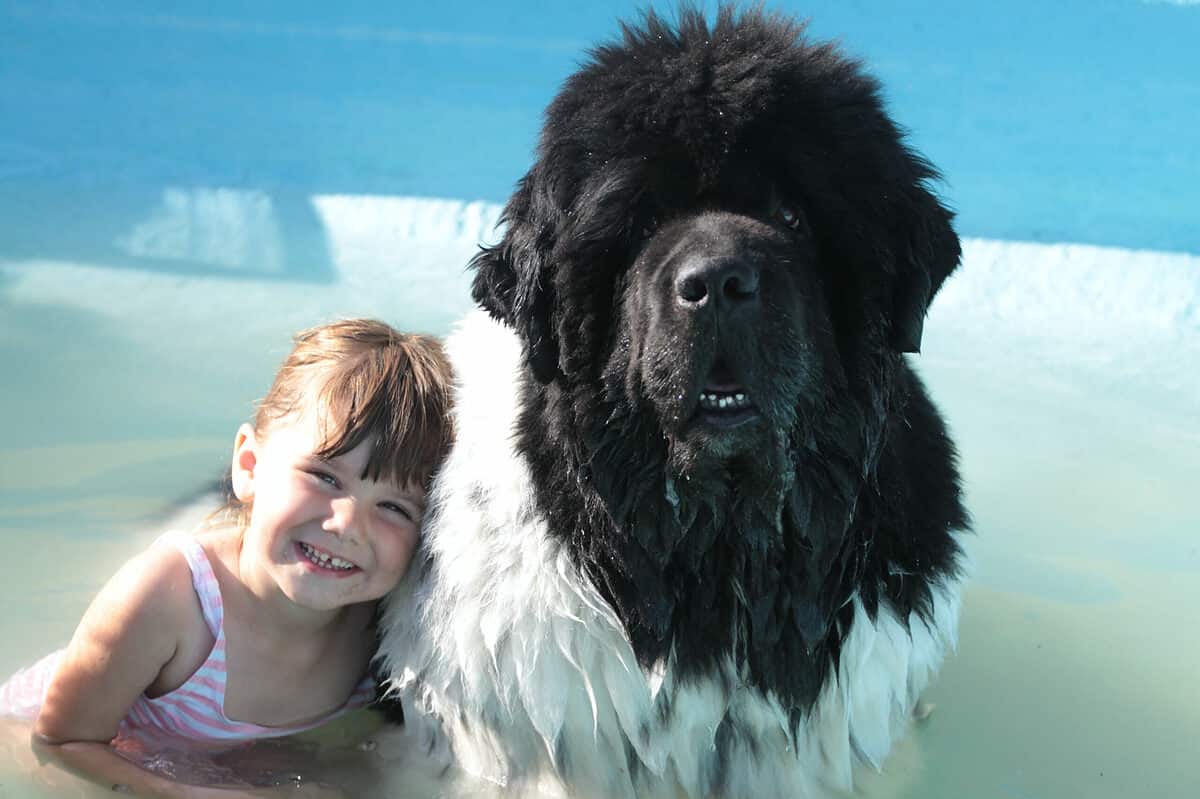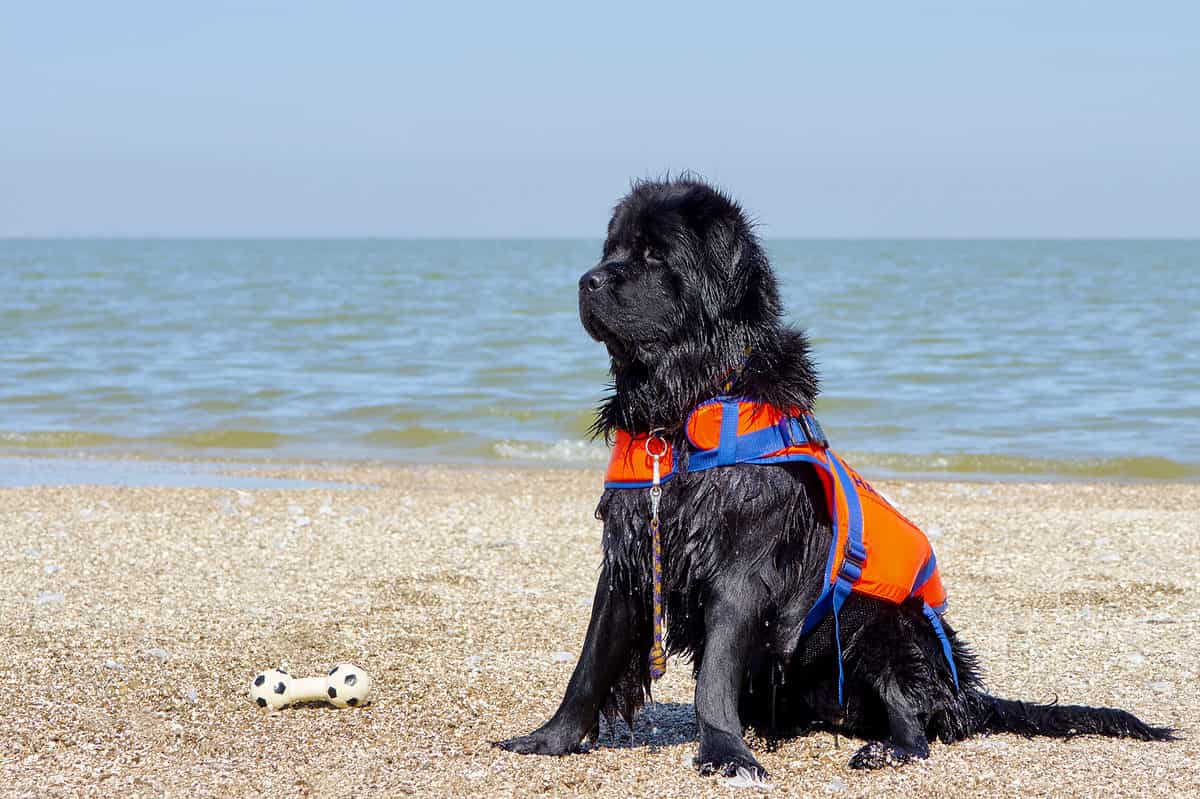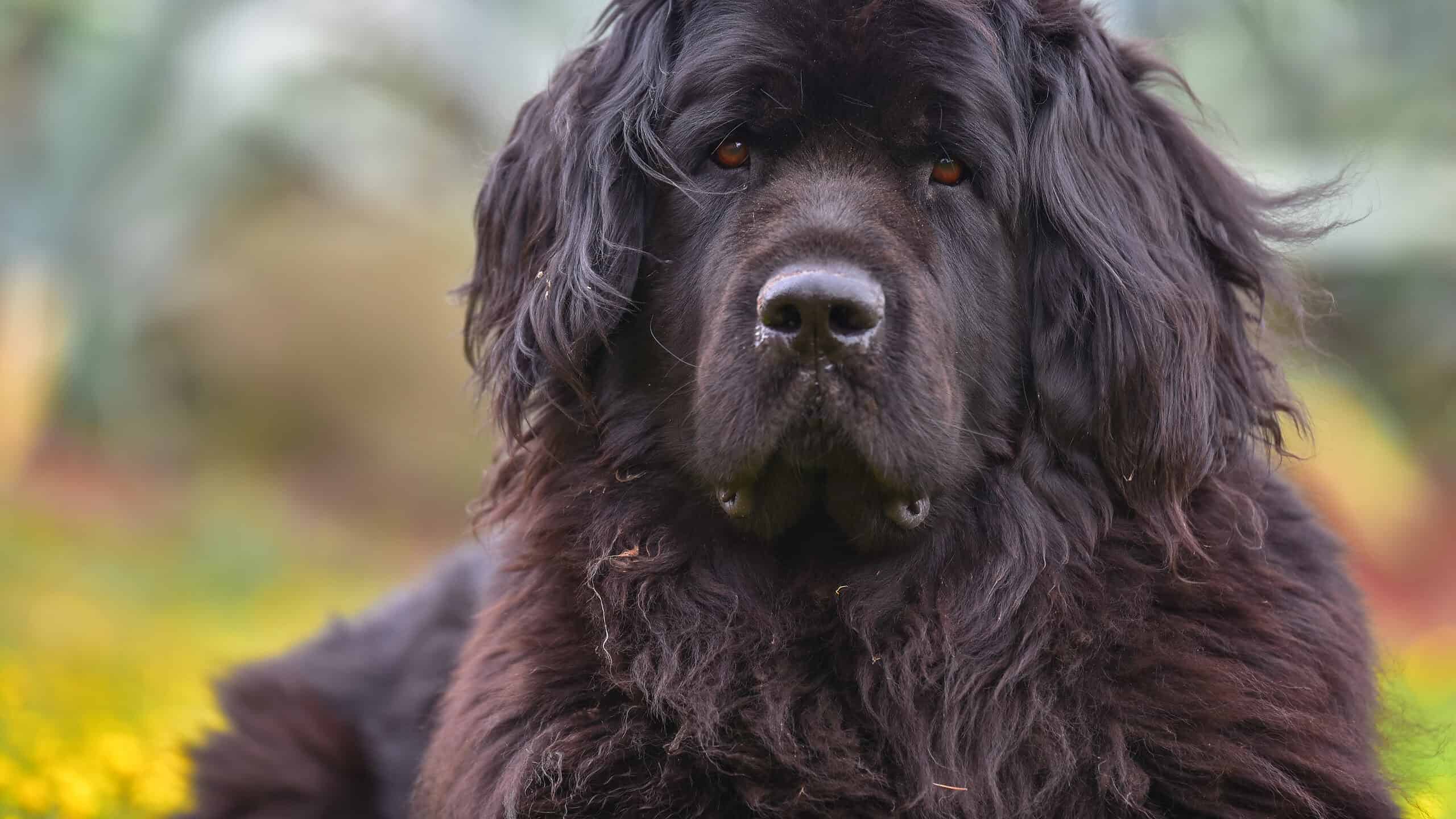Newfoundlands are soft giants who have received the nickname “nanny” dog because of their patience and kindness with kids. They are big dogs, but with their gentle spirit, you may wonder, are Newfoundlands good with kids? It is always important to research before you adopt any breed into your family, so you have come to the right place!
Key Points of Owning a Newfoundland
- Though Newfoundland's size and appearance may be daunting, they are generally relaxed and friendly with most people and dogs.
- Be sure that your home and living space is large enough for a dog of this size.
- Like any dog breed is important to train them fully before introducing them to young children as their size may cause problems with small kids.
Newfoundland Personality and Temperament
Newfoundlands, often called “newfies,” may appear intimidating because of their size. They can weigh up to 150 pounds and grow to 24 inches tall. In addition, their bone structure and large face can make them appear daunting, especially to children. However, Newfoundlands are big softies. They have a peaceful and warm spirit that makes them lovable and great for families.
Newfoundlands are not easily excited. They tend to have a more gentle and relaxed demeanor. A newfie's calm behavior makes it easier for them to adapt to various families and living situations. A Newfoundland can take to living with a single person and a big family. They love people! Their owners mean the world to them. Newfoundlands are very protective of their families, making them wonderful guard dogs. They may not bark as often as other breeds. However, if they sense their family is in trouble, they will not hesitate to protect them.
Overall, Newfoundlands are an affectionate and lovable breed that loves people. They may appear intimidating, but they are big teddy bears.
What a Newfoundland Needs
Newfoundlands are a large breed. Their size alone means they need more space to accommodate their size and needs. They are not ideal dogs for apartment life. Their size may mean they feel cooped up in a small space. If you adopt a Newfoundland, be sure to have plenty of inside and outside areas for it to have room to grow and thrive.
Newfoundlands have a double coat, meaning they tend to shed a lot. Therefore, they require weekly brushing during the off-season. In shedding season, brush them daily to keep their coat looking and feeling fresh and control the shedding. In addition, their nails can grow long, so be sure to trim them regularly.
Newfoundlands have high separation anxiety. They love to be around their people. Attention is one of their favorite things! If you are thinking about adopting a Newfoundland, it is important to be able to give them the attention that they need. Do not leave them alone for long periods. Being alone may cause their separation anxiety to peak and lead to unwanted behavior.
Newfoundlands also drool a lot! So, it can be helpful to keep a drool rag around to keep it all under control.

©Pandas/Shutterstock.com
Health Concerns
Unfortunately, Newfoundlands have a shorter lifespan than other breeds. Their shorter lifespan is attributed to their large size, and they are prone to more health issues. According to PetMD, Newfoundland's general life span is only 8-10 years. Do consider this fact as weigh your options for dog breeds. A few of these health issues that they are prone to are:
Eye Diseases Such as Cherry Eyes and Cataracts
Cherry eyes will cause your newfie's eyes to become red and have protruding tissue. The tear gland will produce more tears, and it's important to check this condition out as soon as possible. Cataracts may cause cloudy eyes, color changes, clumsiness, and more. Cataracts do not hurt your dog, but surgery is one the only curative option for cataracts in your pet.
Subvalvular Aortic Stenoisis
This disease narrows the blood flow in your newfie's left ventricle in their heart. Symptoms to look out for are difficulty breathing, fatigue, coughing, slow growth, and a loud heart murmur. Getting an initial vet checkup will be able to make you aware if your dog has this disease. It is present at birth. Your Newfoundland may be prescribed antibiotics and heart medication to decrease the risk of infections. In addition, reducing the amount of strenuous activity your Newfoundland gets can make the condition easier for them; heart surgery may also be necessary.
Hypothyroidism
Hypothyroidism can be hereditary. The thyroid makes too little thyroid hormone, which leads to this condition. Symptoms to look out for are a dull coat, fatigue, dry skin, sluggishness, and weight gain when they do not have an appetite. This condition may affect the quality of life in your Newfoundland; however, it is not life-threatening. There are medications available to treat this condition.
Hip and Elbow Dysplasia
Dogs with hip dysplasia have abnormally growing joints in their bones. The pressure inside the sockets will cause the joints to rub incorrectly. Symptoms to look out for are dragging the hind legs, abnormal walking, and difficulty walking or standing. Treatment for hip or elbow dysplasia can be physical therapy or medicine to reduce pain.
Bloating
Bloating can be a common health concern in Newfoundlands that can be caused by eating too fast, stress, or large meals. Symptoms to look out for are drooling and nausea, inability to pass gas, and frequent vomiting. Treatment may include pain medicine, fluids, antibiotics, or a stomach tube.
Newfoundlands can also be susceptible to kidney and bladder stones, ruptures in the anterior cruciate ligament, epilepsy, and cancer. Health concerns are very important to consider before adopting a Newfoundland. Although they are more susceptible to certain conditions, it does not always mean they will develop them. Newfoundlands can live a full and happy life with their families and develop no health conditions until later in life, if at all.
Newfoundlands and Allergies
Unfortunately, their double coat may make them more inclined to skin allergies such as atopy, a hereditary predisposition to hypersensitivity, which can cause dermatitis or asthma. Therefore, watching for the signs of a skin allergy in your Newfoundland is essential. A few signs to look for are licking paws, constant ear infections, and rubbing their face.
Newfoundlands are not hypoallergenic. They have a long coat that requires frequent grooming. Being more hands-on with grooming may bother allergies in you or your children more often. High-maintenance grooming needs are an important factor when considering adopting a new pet.
If you or your child have allergies Newfoundlands, though cute and relaxed around children, may not be the best choice. If you or your child requires a more hypoallergenic breed, consider these options.
Cost and Maintenance
Newfoundlands can be a higher-maintenance breed when it comes to grooming. Their double coat makes them shed a lot, meaning they need to be brushed and bathed more often than other breeds. They also are a very large breed, meaning they need more room to grow and thrive. A few costs to consider before adopting a Newfoundland are:
- Adoption costs: $500-$2,000
- Initial vet cost and yearly checkups: $45-$100 a visit
- Food cost: $50-$300 a month
- Vaccines and other procedures, such as spayed or neutered: cost varies depending on the procedure
- Grooming costs: $80-$100 a month
- Miscellaneous expenses: vary but can include leashes, water, food bowls, toys, and more
These are all important factors to consider before adopting a Newfoundland. Adoption costs depend on the breeder's reputation, the coat of your Newfie, and their ancestry. They require more food than other breeds because of their size. Feed them four to five cups of dry dog food a day. It is best to split this up between two meals. Newfies can also be prone to dental issues, brushing their teeth once a week can be very beneficial. However, be sure to use special dog toothpaste. Human toothpaste contains ingredients that may harm them.
Training Your Newfoundland
Newfoundlands are very easy to train. They are diligent, hard workers who are very laid back. They listen well to their owners and pick up on commands easily. This breed is very intelligent and a fast learner. They love to please people and are very patient. These attributes can make training your Newfoundland very easy. Newfies take well to positive reinforcement training and plenty of praise and treats! When you adopt a Newfoundland puppy, training and socializing them early on will help your training go as smoothly as possible! Your pet will be able to adapt to what is expected of them more quickly when they are younger.
Are Newfoundlands and Children a Good Match?
Newfoundlands are very large with big bone structures. Their appearance and size are some things to consider if you have young children. Their size may have you asking, are Newfoundlands good with kids? Yes, Newfies are very good with kids! They have earned their nickname “nanny dog” for a good reason. Newfoundlands are patient, gentle, and easily forgiving. Their patient demeanor means that if your child is accidentally rough with them, your Newfie will likely not overreact. However, it is always important to supervise the interaction between your dog and child. Accidents happen, and Newfoundlands are very large dogs that may accidentally knock over a small child.
Newfoundlands are not aggressive dogs but very protective, making them excellent guard dogs loyal to their families, especially the children.
This breed is sweet and passive. Newfoundlands love to perform tasks and work. They would make a great addition to a family with children!

©Da Silva Emmanuelle/Shutterstock.com
Raising Kids Around a Newfoundland
As a parent, it is imperative to supervise your Newfoundland when they are around an infant. The large breed is not recommended for raising with infants because of its size. They may accidentally knock over an infant, causing the baby to get hurt. In addition, Newfies may appear scary to a small child because of their size and large bone structure.
Newfoundlands are not big barkers. However, they bark when they feel their family is in danger. So, if you are looking for a guard dog, this trait is excellent if you have young children who still nap!
Newfoundlands are cuddly, patient, and forgiving. Their disposition makes them great dogs to raise around children. They can also get along great with other dogs and cats. Like with all breeds, it is still important to supervise children and your Newfie together, no matter how gentle they may be. Like each child is different, every dog has its own personality and tolerance level. Therefore, it is vital to get to know your Newfoundland and child and assess whether they can be respectful of one another.
Teach Your Child to Respect Your Newfoundland
Teaching your child to respect your new Newfoundland is vital, as with all dogs. Teach your child to think of their pet as a friend, not a toy. Here are some great respect rules to teach your child before introducing them to your Newfoundland or a new pet in general!
- Always respect your dog's space, and do not try to take their food or their toys. They may become territorial.
- Do not attempt to ride on any dog.
- Be sure not to pull or tug at a dog's tail, ears, or body.
- Do not get in a dog's face. Even the most gentle dog can have a bad day and become irritated, and you never know how they may react to being pestered when they don't want to be.
- If your dog has just had puppies, do not take any of their babies away from them. Momma dogs, like humans, are very protective of their babies.
These are just a few simple ways to teach your child to respect their Newfoundland. Getting your child involved in the grooming and training of your Newfie can be a wonderful experience for both. It can deepen their bond even more!
Exercising Your Newfoundland
Newfoundlands love to swim! Fun fact, they have a water-resistant coat and partially webbed feet. They have low exercise needs and are not quite as energetic as other breeds. However, they still need at least 30 minutes of exercise daily because of their size. Swimming is a wonderful exercise for this breed because it is easy on their joints and body. They also love to go for long walks. Newfies grow rapidly in the first seven months of their life. So, it is recommended not to allow them to run on pavement or gravel as a pup. Instead, stick to grassy and soft areas. If they do run on hard pavement, it can make them susceptible to bone and joint issues. Remember to always keep your Newfoundland cool and hydrated in the heat. Their double coat can make them prone to dehydration and heat exhaustion.

©Olefirenko Vitaly/Shutterstock.com
Newfoundland History
Newfoundlands date back to the Vikings' era over 1,000 years ago. They were initially used to save drowning fishermen as working dogs. Their water-resistant coat and webbed feet mean they are great swimmers, making them the perfect rescue dog! In history, they have also been used as guard dogs because of their size and loyalty. Take a look at some of the best types of Newfoundland dogs!
In Conclusion
So, are Newfoundlands good with kids? Yes! Their gentle and patient demeanor makes them excellent companions for children. Newfies are loyal and protective of their families, especially the children of the family. They are very forgiving and can tolerate accidental rough play very well. It is important to remember, though, their size may scare young children. Raising an infant around Newfoundland may be challenging because your Newfie might accidentally knock your baby over. They do not tend to bark unless they feel like their family may be in danger, which is great for nap time. This breed has rightfully earned its nickname, the “nanny” dog!
The image featured at the top of this post is ©Pandas/Shutterstock.com.

